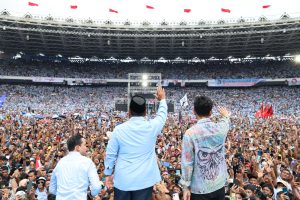Just days ahead of his inauguration as Indonesia’s president, Prabowo Subianto is seeking to bring the country’s biggest political party into his already dominant parliamentary coalition.
According to a report by Reuters, Prabowo’s top aide Sufmi Dasco Ahmad said that the former general and Megawati Sukarnoputri, the head of the Indonesian Democratic Party of Struggle (PDI-P), planned to meet. This came after Pramono Anung, a senior PDI-P politician, met with Prabowo yesterday to convey a message from Megawati.
Dasco declined to divulge either the content of this message, or the date of the planned meeting between Prabowo and Megawati, who served as president during 2001-04.
The comment came as Prabowo spent a second day interviewing “dozens” of possible candidates for deputy minister posts, Dasco said. This came a day after he met with more than 40 people at his South Jakarta residence on Monday, in a bid to finalize his cabinet ahead of his inauguration on October 20. These included current Finance Minister Sri Mulyani Indrawati, who later confirmed that Prabowo had asked her to remain in the post under his administration.
In mid-August, the leaders of five political parties that had supported rival tickets during the presidential election in February declared their support for Prabowo’s administration, leaving the PDI-P as the only parliamentary party outside the tent of his Advanced Indonesia Coalition.
The suggestion that the PDI-P could join Prabowo’s coalition is not new. As far back as April, Prabowo’s Gerindra party was suggesting that he would meet for talks with Megawati. The party’s political affairs chair, Puan Maharani, said last month that talks were underway, and that there was “nothing impossible” about such an alignment.
Since February’s presidential election, the PDI-P has found itself in a curious political position. While outgoing President Joko “Jokowi” Widodo ran under the party’s banner during his successful runs at the presidency in 2014 and 2019, he pointedly did not endorse the PDI-P’s presidential candidate, Ganjar Pranowo, ahead of this year’s election. Instead, he expressed veiled support for Prabowo, whom he had defeated in the past two presidential contests. Prabowo and his running-mate, Jokowi’s eldest son Gibran Rakabuming Raka, went on to win a decisive victory, clinching more than 58 percent of the vote.
While Ganjar came in third place in the presidential election, winning just over 16 percent of the vote, the PDI-P won a plurality of the vote in the concurrent – and highly fragmented – parliamentary election, winning with just 16.7 percent of the vote.
It is unclear whether Prabowo can negotiate a deal to bring the PDI-P into his already capacious coalition. But if he succeeds, it would effectively create a government without parliamentary opposition. As the Reuters report notes, this would be “an unprecedented situation since Indonesia began holding direct presidential elections in 2004.”
To be sure, Indonesia has a recent history of broad and inclusive coalitions, a fact that is made easier by the fact that political parties usually have weak ideological bases, allowing for swift realignments. (Despite fighting a bitter presidential campaign in 2019, Jokowi appointed Prabowo as his defense minister.) Jokowi’s outgoing coalition includes eight of the nine parties with seats in parliament.
Whether or not the PDI-P joins the coalition will make little different to Prabowo’s ability to pass legislation: the Advanced Indonesia Coalition already controls more than 80 percent of seats in the lower house. But the lack of a parliamentary opposition party would mark a baleful milestone in the trajectory of Indonesian politics since the reforms instituted in the aftermath of Suharto’s fall from power in 1998.
In an article for Fulcrum in January, Ian Wilson of Murdoch University argued that a Prabowo presidency could see “an expansion of ‘opposition-less’ approaches to governing” that have already advanced to some extent by Jokowi. This involves concerted attempts to “narrow” the field for political contestation through tweaks to the country’s institutions and laws. A recent example was the parliament’s failed attempt to alter election laws ahead of next month’s massive regional elections, which critics said would have resulted in dozens of important regional seats going uncontested, or being lopsided contests.
The logic of this approach, Wilson wrote, “is to remove parliamentary opposition and curtail the emergence of rival power bases. This is done not by overt repression but co-optation into large ruling coalitions managed via negotiations and inter-elite deals.”

































